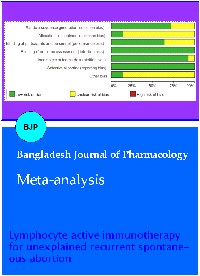Lymphocyte active immunotherapy for unexplained recurrent spontaneous abortion
Abstract
This study is to evaluate the curative effect of lymphocyte active immune treatment for unexplained recurrent spontaneous abortion. Fourteen randomized controlled trials of 994 subjects were included. Blocking antibody positive rate of patients who experienced a new pregnancy showed significant differences between immunotherapy and placebo. Moreover, live birth rate among paternal or third-party donor lymphocytes and placebo groups had significant difference [RR= 1.63, 95% CI (1.38-1.92), p<0.05]. Trial sequential analysis showed that the Z-curve crosses the trial sequential monitoring boundaries, confirming that the clinical benefit of active immunotherapy was significant. Subgroup analysis suggests that immunotherapy with lymphocytes might be more effective for primary recurrent spontaneous abortion than for secondary recurrent miscarriage. Taken together, women with primary recurrent spontaneous abortion who are negative for blocking antibody prior to treatment seemed most likely to obtain a potential beneficial effect of lymphocyte active immunotherapy, but not secondary recurrent spontaneous abortion.
References
Alijotas-Reig J, Garrido-Gimenez C. Current concepts and new trends in the diagnosis and management of recurrent miscarriage. Obstet Gynecol Surv. 2013; 68: 445-66.
Carp HJ, Toder V, Torchinsky A, Portuguese S, Lipitz S, Gazit E, Mashiach S. Allogenic leukocyte immunization after five or more miscarriages. Recurrent Miscarriage Immunotherapy Trialists Group. Hum Reprod. 1997; 12: 250-55.
Cauchi MN, Lim D, Young DE, Kloss M, Pepperell RJ. Treatment of recurrent aborters by immunization with paternal cells: Controlled trial. Am J Reprod Immunol. 1991; 25: 16-17.
Christiansen OB. Advances of intravenous immunoglobulin G in modulation of anti-fetal immunity in selected at-risk populations: Science and therapeutics. Clin Exp Immunol. 2014; (Suppl 1) 178: 120-22.
Christiansen OB, Mathiesen O, Husth M, Lauritsen JG, Grunnet N. Placebo-controlled trial of active immunization with third party leukocytes in recurrent miscarriage. Acta Obstet Gynecol Scand. 1994; 73: 261-68.
Clark DA, Daya S. Trials and tribulation in the treatment of recurrent spontaneous abortion. Am J Reprod Immunol. 1991; 25: 18-24.
Cohen M, Bischof P. Factors regulating trophoblast invasion. Gynecol Obstet Invest. 2007; 64: 126-30.
Cui YP, Zhong XY, Ban QM, Hu K, Xiao SJ. Study of immunotherapy with lymphocytes in women with recurrent spontaneous abortion. Modern Prev Med. 2011; 38: 1626-27.
Egerup P, Lindschou J, Gluud C, Christiansen OB. The effects of intravenous immunoglobulins in women with recurrent miscarriages: A systematic review of randomised trials with meta-analyses and trial sequential analyses including individual patient data. PLoS One. 2015; 10: e0141588.
Gatenby PA, Cameron K, Simes RJ, Adelstein S, Bennett MJ, Jansen RP, Shearman RP, Stewart GJ, Whittle M, Doran TJ. Treatment of recurrent spontaneous abortion by immunization with paternal lymphocytes: Results of a controlled trial. Am J Reprod Immunol. 1993; 29: 88-94.
Ho HN, Gill III TJ, Hsieh HJ, Jiang JJ, Lee TY, Hsieh CY. Immunotherapy for recurrent spontaneous abortions in a Chinese population. Am J Reprod Immunol. 1991; 25: 10-15.
Illeni MT, Marelli G, Parazzini F, Acaia B, Bocciolone L, Bontempelli M, Faden D, Fedele L, Maffeis A, Radici E. Immunotherapy and recurrent abortion: A randomized clinical trial. Hum Reprod. 1994; 9: 1247-49.
Kheshtchin N, Gharagozloo M, Andalib A, Ghahiri A, Maracy MRRezaei A. The expression of Th1- and Th2-related chemokine receptors in women with recurrent miscarriage: The impact of lymphocyte immunotherapy. Am J Reprod Immunol. 2010; 64: 104-12.
Kuon RJ, Wallwiener LM, Germeyer A, Strowitzki T, Daniel V, Toth B. Establishment of a standardized immunological diagnostic procedure in RM patients. J Reprod Immunol. 2012; 94: 55.
Liang BZ, Tan ZW, Li CP, Li YP. Study of immunotherapy with lymphocytes in women with recurrent spontaneous abortion. Matern Child Health Care China. 2007; 22: 3561-62.
Mowbray JF, Underwood JL. Abstracts of contributors' individual data submitted to the Worldwide prospective observation study on immunotherapy for treatment of recurrent spontaneous abortion. Am J Reprod Immunol. 1994; 32: 261-74.
Mowbray JF, Gibbings C, Liddell H, Reginald PW, Underwood JL, Beard RW. Controlled trial of treatment of recurrent spontaneous abortion by immunisation with paternal cells. Lancet 1985; 325: 941-43.
Ober C, Karrison T, Odem RR, Barnes RB, Branch DW, Stephenson MD, Baron B, Walker MA, Scott JR, Schreiber JR. Mononuclear-cell immunisation in prevention of recurrent miscarriages: A randomised trial. Lancet 1999; 354: 365-69.
Pandey MK, Agrawal S. Induction of MLR-Bf and protection of fetal loss: A current double blind randomized trial of paternal lymphocyte immunization for women with recurrent spontaneous abortion. Int Immunopharmacol. 2004; 4: 289-98.
Pandey MK, Halder A, Agarwal S, Srivastava M, Agarwal SS, Agrawal S. Immunotherapy in recurrent spontaneous abortion: Randomized and non-randomized trials. Internet J Gynecol Obstet. 2003; 2.
Rai R, Regan L. Recurrent miscarriage. Lancet 2006; 368: 601-11.
Regan L, Rai R. Epidemiology and the medical causes of miscarriage. Baillieres Best Pract Res Clin Obstet Gynaecol. 2000; 14: 839-54.
Wong LF, Porter TF, Scott JR. Immunotherapy for recurrent miscarriage. Cochrane Database Syst Rev. 2014; Cd000112.

Apply citation style format of Bangladesh Journal of Pharmacology
Copyright (c) 2019 Xian Jiang Wei, Xiao Qin Fang, Ling Tong

This work is licensed under a Creative Commons Attribution 4.0 International License.
